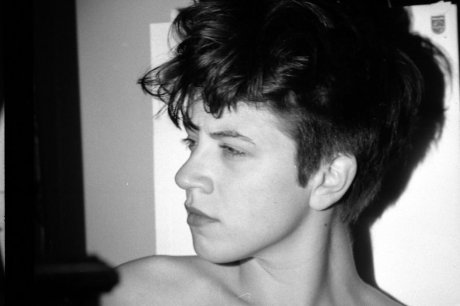Want to feel like you’ve wasted your life? Start by reading Vivien Goldman’s Press Color liner-notes bio of Lizzy Mercier Descloux. At 22 years of age, Descloux moved to New York during those chaotic years of the late 70s when the death throes of punk’s first wave were giving birth to its deformed children. Before the decade was over, she had roomed with Patti Smith, had a star-crossed affair with Richard Hell, and pumped out several releases on her long-time partner Michel Esteban’s too-cool-for-school label ZE Records. Descloux cut a bright and dashing figure in a scene that, even at this early stage of development, was already settling into a kind of monochromatic conformity.
By the time Descloux put out her solo debut single “Fire”/”Mission Impossible,” ZE was well on its way to solidifying its identity around its patented mutant discoTM sound, thanks to artists like Cristina, Don Armando’s Second Avenue Rhumba Band, and Sympho-State — acts that blurred the lines between earnest homage and outright parody. Descloux’s comparatively Spartan and angular sound put her closer to lablemate James Chance, but where Chance’s music embodied menace and a dystopian vacuity, Descloux’s was animated by a sense of playful absurdity: nonsense lyrics, left-field covers (not one, but two reworkings of compositions from Lalo Schifrin’s Mission Impossible soundtrack, and buoyant dancefloor-ready beats.
Her take on Arthur Brown’s 1968 hit is perhaps the most electrifying song on the album. Descloux pares away the original’s screeching Hammond and lets that throbbing bass line and whoever’s pounding away at the cowbell take center stage. Having reduced the song to its bare rhythmic elements, she then builds it back up, tossing in some gospel-choir backing vocals, subtle synthesized beats, and a sax solo for good measure. And of course, there’s Lizzy herself, standing in for the God of Hellfire, sing-talking her way through a stripped-down version of the lyrics with childlike exuberance.
In keeping with the prevailing philosophy of the time, neither Descloux nor her chief collaborator (and sometime lover) D.J. Barnes were trained musicians, a fact that Descloux implicitly acknowledges on the reggae-inflected “Golden Throat.” But where the unschooled nature of contemporaries like Mars and Teenage Jesus And The Jerks gave voice to an inchoate ugliness and nihilism, Descloux’s reveals a pure joy in the act of discovery. There is an innocence to songs like her rendition of “Jim on the Move” that’s infectious, and it shines through on even the least developed offerings on the album.
The new Light in the Attic edition of the album maintains ZE’s 2003 tracklisting, including the original eight-song LP, Descloux’s first EP with Barnes as the duo Rosa Yemen, and a handful of non-album miscellany. The Rosa Yemen EP provides a handy missing link between the harsher sounds of the no-wave underground and the punk-funk of her solo debut. The songs are mostly lacking in percussion and turn around an uneasy interplay between her and her partner’s guitars. Songs like “Rosa Vertov” and “Herpes Simplex” also supply some of Descloux’s most frantic and anxiety-ridden vocal deliveries. Of the remaining tracks, “Morning High” is the best, a swirling drone creating a canvas for a bilingual duet between Descloux and Patti Smith, each reciting a poem by their mutual love, Rimbaud (although, having been recorded in 1995 as part of an album-length project by Bill Laswell, it also feels the most temporally dislocated on this compilation).
Reading over Goldman’s profile and seeing Descloux through the eyes of the many men (especially Hell) who “crashed on those rocks,” it’s easy to view her as the ultimate manic pixie dream girl brought to life: this boisterous, exotic, fashion-forward French girl who flitted from man-to-man and from medium-to-medium the way a bee hops among the flowers. Yet I think it’s more fitting to think of her as a punk rock Sarah Conner, taking up with anyone who had something to teach her, anyone who could expand her headspace and help her develop as an artist. Sarah had her impending war and her messianic scion. Lizzy had a black-and-white world in desperate need of some color.
More about: Lizzy Mercier Descloux

